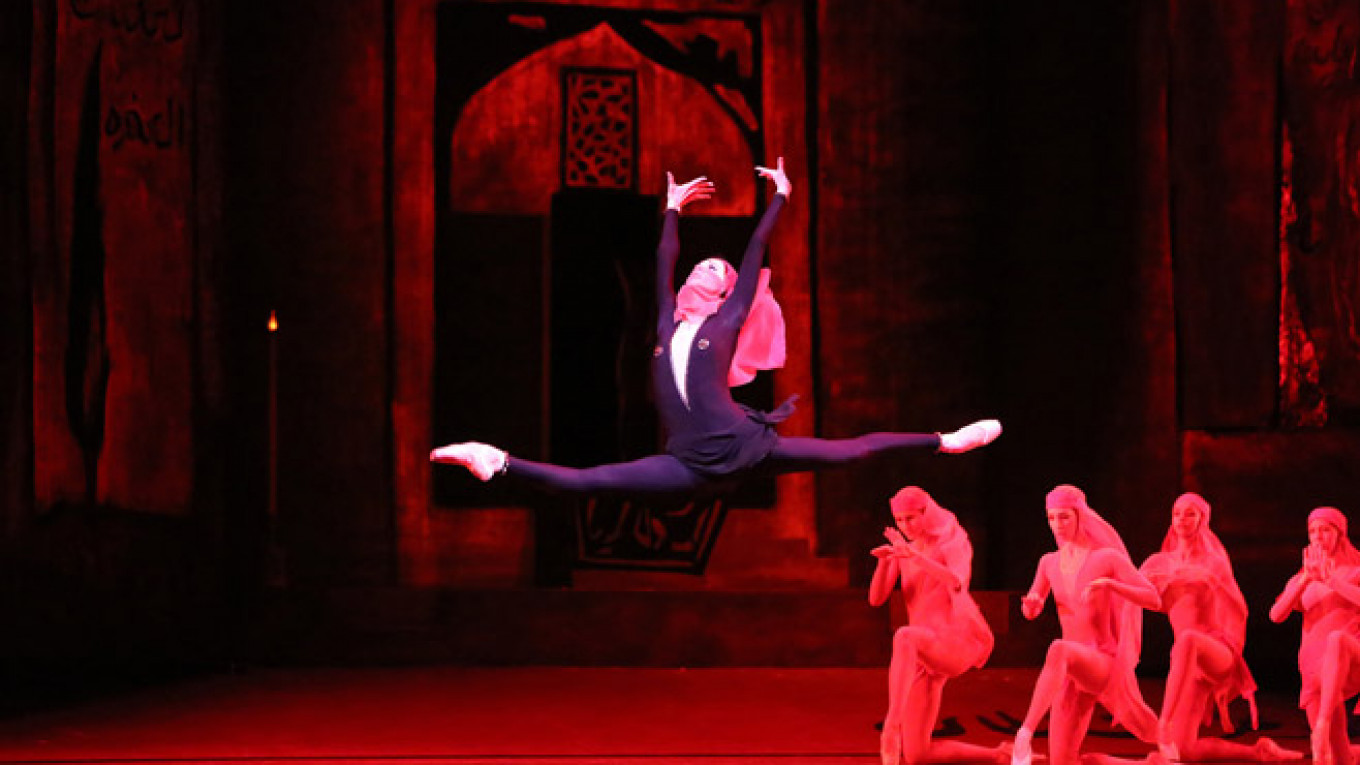Prior to the Bolshoi Theater's revival two weeks ago of Yury Grigorovich's "A Legend of Love," I had long considered it the best of the 15 Grigorovich ballets I know at first hand and the one likely to have the best chance of standing the test of time. But I'm no longer certain my judgment was correct.
No doubt my tastes in ballet have changed since I last saw "A Legend of Love" nearly a decade ago. But my disappointment at the opening night of the revival may have been due at least as much to the theater's unfortunate casting of the ballet's central roles.
With its story based on a play by Turkish writer Nazym Hikmet derived from legends of the Near East and music by Azerbaijani composer Arif Melikhov, "A Legend of Love" first appeared in 1961 at the Kirov (now Mariinsky) Theater in Leningrad, with Rudolf Nureyev, soon to defect from the Soviet Union, dancing the role of Ferkhad. Four years later, it came to the Bolshoi, where it has been seen with some regularity ever since.
The ballet begins as a certain Queen Mekhmene Banu is told by a stranger that, if she sacrifices her beauty, her dying younger sister Shireen will be restored to health. Mekhmene Banu complies, and Shireen recovers. In the palace square, the sisters meet an artist named Ferkhad, and both fall in love with him. It is Shireen, however, who wins his heart. A distraught Mekhmene Banu commands that the lovers be seized. In order to win Shireen, she tells Ferkhad, he must accomplish a seemingly impossible task, that of boring a hole through the nearby iron mountain that blocks the way to a desperately needed source of water. Ferkhad makes his way to the mountain. Meanwhile, Shireen convinces her sister to relent. The two of them rush to the mountain, where a crowd has gathered to watch Ferkhad. He and Shireen joyfully throw themselves into each other's arms. Nevertheless, Ferkhad decides to remain at the mountain and accomplish his task for the sake of his compatriots, who are dying of thirst, and to prove his love for Shireen.
Despite having experienced and very successful interpreters of Mekhmene Banu, Shireen and Ferkhad in its dance troupe, the Bolshoi chose to cast the roles on opening night with newcomers. None of the three proved nearly as convincing as any of the
dancers I had previously seen.
Svetlana Zakharova is a stellar attraction at the Bolshoi who can lift her limbs higher and jump farther than any of her female colleagues in the troupe. But as Mekhmene Banu, she seemed to have no real grasp of the character she was portraying. Except at a few fleeting moments, her movements seemed to me simply a series of beautifully performed exercises.
Anna Nikulina, as Shireen, danced nicely for the most part, but proved bland and rather lifeless in comparison with the Shireens of Marianna Ryzhkina and Nina Kaptsova whom I recall from the past. The powerfully built and technically assured Denis Rodkin would seem to have the makings of a splendid Ferkhad, but he has yet to create a persuasive character. I came away with practically no recollection of his performance.
My memories from earlier times of "A Legend of Love" were of a dark and compelling drama with a truly oriental atmosphere and much imaginative choreography. But seeing it again two weeks ago, I was struck by how much of it looked like pure Soviet-era kitsch, particularly when it came to the corps de ballet's repeated and rather tiresome display of pseudo-oriental hand, arm and body movements.
As with Grigorovich's even kitschier, but ever-popular ballet "Spartacus," there is much to commend in the solos and duets he created for "A Legend of Love." With stronger casting of the principal roles than at the revival's opening, these alone could make watching the ballet a reasonably satisfying experience.
In addition to Zakharova, the Bolshoi has assigned the role of Mekhmene Banu in the current revival to Maria Allash, Maria Alexandrova and Yekaterina Shipulina, all of whom proved superb interpreters of it in the past, and to Yekaterina Krysanova, who, making her debut in the part, may well bring to it some of the eroticism she added to her already impeccable dancing in last July's Bolshoi premiere of "The Taming of the Shrew."
In the remainder of this week's second run of performances, Allash is due to dance Mekhmene Banu on Friday and Alexandrova on Sunday, while Thursday's cast once again features Zakharova.
"A Legend of Love" (Legenda o lyubvy) plays Thursday and Friday at 7 p.m. and Sunday at 6 p.m. at the Bolshoi Theater's main stage. 1 Teatralnaya Ploshchad. Metro Teatralnaya. +7 (495) 455-5555.
Contact the author at artsreporter@imedia.ru
A Message from The Moscow Times:
Dear readers,
We are facing unprecedented challenges. Russia's Prosecutor General's Office has designated The Moscow Times as an "undesirable" organization, criminalizing our work and putting our staff at risk of prosecution. This follows our earlier unjust labeling as a "foreign agent."
These actions are direct attempts to silence independent journalism in Russia. The authorities claim our work "discredits the decisions of the Russian leadership." We see things differently: we strive to provide accurate, unbiased reporting on Russia.
We, the journalists of The Moscow Times, refuse to be silenced. But to continue our work, we need your help.
Your support, no matter how small, makes a world of difference. If you can, please support us monthly starting from just $2. It's quick to set up, and every contribution makes a significant impact.
By supporting The Moscow Times, you're defending open, independent journalism in the face of repression. Thank you for standing with us.
Remind me later.






